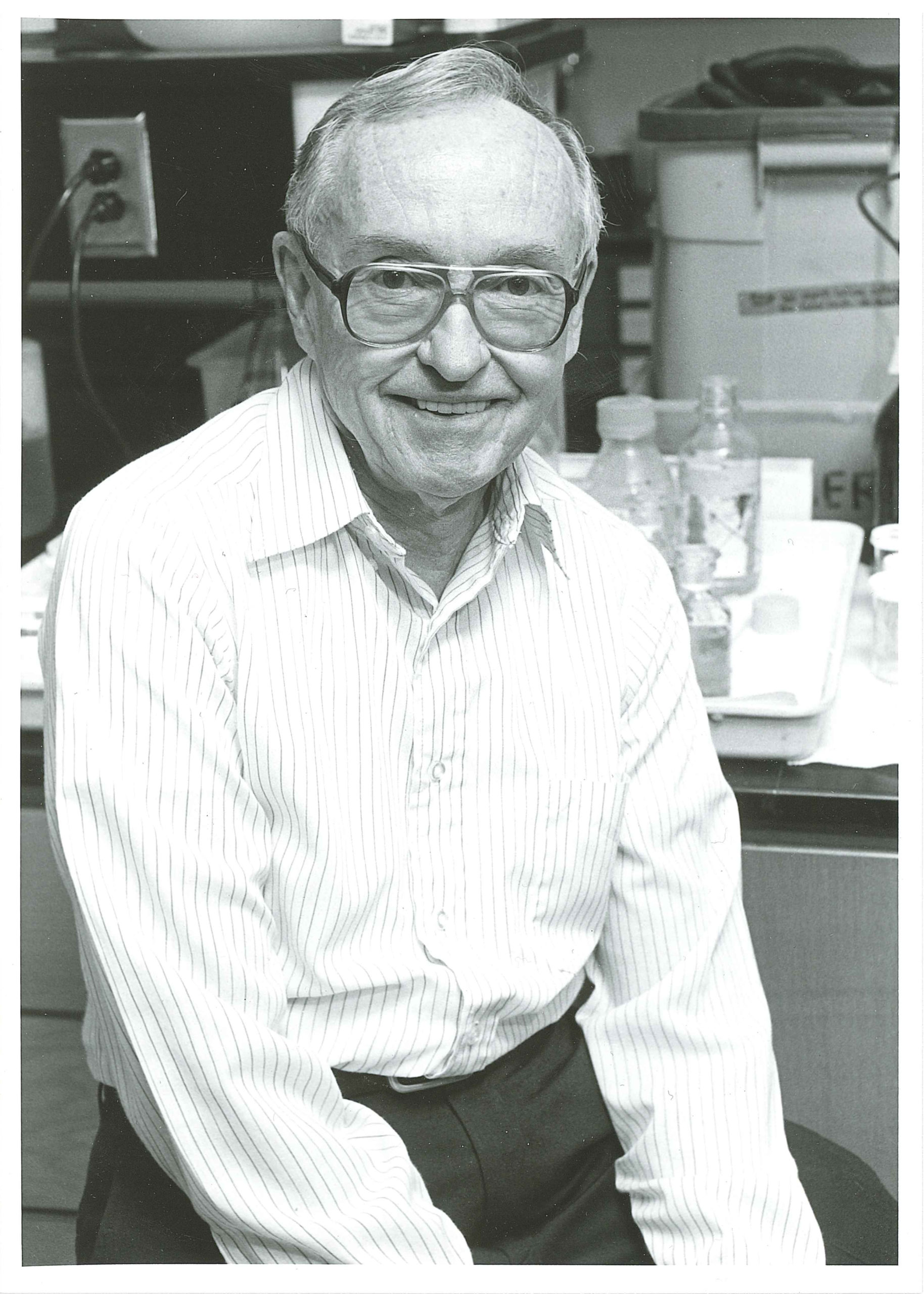Lawrence R. Pomeroy
June 2, 1925 – March 26, 2020
Lawrence R. Pomeroy, Alumni Foundation Professor Emeritus of Ecology at the University of Georgia, passed away peacefully on March 26, 2020, in Burlington, North Carolina. He was 94.
“Larry Pomeroy was one of the most influential ecologists of our time,” said John L. Gittleman, dean of the Odum School of Ecology and UGA Foundation Professor. “He changed the way we understand nutrient cycling, particularly through the concept of the microbial loop. His work had an impact beyond academia too, contributing to the protection given to Georgia’s coastal ecosystems. Despite his achievements, he was a sincerely modest, kind and generous person. He will be greatly missed by all who had the privilege of knowing him.”
Larry Pomeroy was born June 2, 1925, in Sayre, Penn., and grew up in Watkins Glen, New York, and Pass-a-Grille, Florida. His interest in the natural world and marine science began early. He wrote a nature column for the local newspaper while a high school student, and worked for a time as a commercial fisherman, gaining invaluable experience that would serve him well for the rest of his career. He received his bachelor’s and master’s degrees in zoology from the University of Michigan and a doctorate in marine science at Rutgers University in 1951, studying oysters with Prof. Hal Haskins. It was there that he developed his interest in biogeochemistry.
After doing postdoctoral work at the Oyster Research Lab—now the Haskin Shellfish Research Laboratory at Rutgers—he accepted a position at the newly established University of Georgia Marine Institute on Sapelo Island in 1954. Along with his wife Janet, he spent the next six years there, developing a research program from scratch.
His early work on Sapelo was based on studying the organisms and ecological processes of the island’s salt marshes and estuary as a system, a highly innovative concept at that time. This required not only scientific knowledge and curiosity but also practical skills. Besides his ability to handle boats, he was able to make do with the limited resources of this brand new and quite remote field station to create the scientific equipment he needed. After four years on Sapelo he became the Marine Institute’s acting director. By the time he left to join the zoology department on UGA’s main campus in Athens in 1960, he had helped build the program and facilities into a modern and highly productive research institute.
Once Dr. Pomeroy joined the zoology department at UGA, his research interests began to expand to include studies of microbial ecology in both coastal and oceanographic systems. He also began conducting research in the Pacific Ocean. In 1971 he and his postdoc, the late Bob Johannes, led the Symbios Expedition to Enewetak Atoll in the Marshall Islands aboard the R/V Alpha Helix. With an interdisciplinary crew of 25 ecologists and oceanographers, the two-month Symbios Expedition was the most comprehensive study of coral reefs to have been at that time. It was designed to follow and expand upon Eugene and Howard T. Odum’s groundbreaking 1954 study of energy flow across the coral reef ecosystem on Enewetak. The results of the Symbios Expedition continue to influence the scientific understanding of coral reef ecosystems to this day.
Dr. Pomeroy’s contributions to science were many, including research that changed our understanding of phosphorus cycling, the promotion and use of high-quality food web modeling, and studies of how temperature limits Arctic food webs. He is probably best known, however, for developing the concept of the “microbial loop.” His 1974 paper in BioScience, “The Ocean’s Food Web: A Changing Paradigm,” completely upended the established scientific understanding of the trophic dynamics of the ocean. His idea that microbes, rather than large organisms, were the driving force in marine food webs was radical at the time, and only began to be accepted in the 1980s when they were backed up by another scientist, Farooq Azam, using new technology. This concept of the microbial loop became highly influential in terrestrial soil ecology as well. In 1993, the Microbial Loop Symposium was held in honor of Dr. Pomeroy’s enormous contributions to microbial ecology.
Dr. Pomeroy was elected a Fellow of the American Association for the Advancement of Science in 1958 and served as president of the Association for the Sciences of Limnology and Oceanography from 1983-84 Among his many other honors and awards were the Antarctica Service Medal from the National Science Foundation, the A.G. Huntsman Award for Excellence in the Marine Sciences from the Royal Society of Canada, the Odum Lifetime Achievement Award from the Coastal and Estuarine Research Federation, the G. Evelyn Hutchinson Medal from the Association for the Sciences of Limnology and Oceanography in recognition of his “clear thinking and leadership in studies of phosphorus and microbes in estuaries and oceans,” and the University of Georgia Creative Research Award. He published more than 100 scholarly works and mentored 27 graduate students. He retired in 1992 as Alumni Foundation Distinguished Professor.
He leaves behind his children, Cheryl Pomeroy of Cuenca, Ecuador, and Russell Pomeroy, of Greensboro, North Carolina, and three grandchildren, Claire P. Gerner and Jacob and Katy Pomeroy. He was predeceased by Janet Klerk Pomeroy, his beloved wife of 57 years, who passed away in 2009.
Gifts in memory of Dr. Pomeroy may be made to the Ecology Fund at the University of Georgia to support students working in the areas of coastal ecology and marine ecosystem studies by visiting ecology.uga.edu/give/ and including Pomeroy in the Special Instructions / Comments area, or by sending a check to: UGA Foundation, 1 Press Place, Suite 101, Athens, GA 30602. Please make your check out to UGA Foundation with Ecology Fund/Pomeroy in the memo line.

